Court Notifications for Hamilton County As part of CALEB's effort to to support a more effective pretrial process that ends wealth-based detention and invests in community support rather than supervision, we've finalized a policy brief on the numerous benefits of a court attendance notification system (CANS). Timely court notifications can do better than cash bond at promoting better attendance. See more at www.calebcha.org/notifications.
0 Comments
[The Times Free Press] recently reported that the Whitfield County magistrate judge is no longer requiring cash bail of most people charged with misdemeanors. We believe this is a smart thing to do and benefits everyone in the community. Not only is it more fair for defendants, it also saves taxpayers a large amount of money.
In our current system two people who have the SAME charge can have totally different outcomes, depending on their finances. One can pay for their release and later return to court, while the one without financial means stays in jail. We know that staying in jail makes it less likely that they will have charges dropped or will be found not guilty. Is it justice to penalize people simply because they are poor? Critics of bail reform often say: "They did the crime. Let them stay in jail." This belief assumes that only guilty people are put in jail. We know this isn't true. Legally, all individuals are innocent unless proven guilty. Critics say: "What about public safety?" The law says bond is supposed to be denied when a person poses a risk to public safety. We hear an uproar when someone is released without bail and goes on to commit a violent crime. However, these cases are exceedingly rare - that is why they tend to make the news. The vast majority of people who are released without bail do comply with their conditions of release. We know that people released on cash bail also sometimes commit violent crimes, so we see that cash bail alone does not ensure public safety. It simply punishes those who lack the money to pay bail. There is considerable evidence showing that even a few days in jail can cause a person's life to unravel. An individual may have to drop out of school or lose their job, housing, car or even the custody of children. This disruption can lead people to take a guilty plea just to get back to their lives. As a result of the guilty plea, they now have a criminal record that causes all kinds of future consequences. Money paid for bail is never refunded, even if a case is dismissed or a person is judged innocent. Critics say: "People need to have skin in the game. They won't come to court if they don't pay money bail." In fact, jurisdictions across the nation have already proven court appearance rates are significantly higher when people simply receive reminder texts about their court date. Non-profit bail funds like the Hamilton County Community Bail Fund have also demonstrated that court date reminders and community support, like transportation, improve the likelihood that people will return to court to resolve their case. Critics say: "That won't work here." It has already worked. In early 2020, the Hamilton County court system released about 200 individuals charged with non-violent offenses during the pandemic. During that time, there was no increase in crime. Tennessee law mandates that judges use cash bail only as a last resort and it should be imposed "only if other less restrictive conditions are deemed insufficient to ensure someone appears for their trial." Furthermore, the U.S. Constitution prohibits excessive bail. As in Whitfield County, Hamilton County has plenty of opportunities for action at a local level. Bail hearings being implemented in other parts of the state provide a method for increased release without restrictions, as well as protecting defendants' constitutional right to affordable bail. The Sheriff's Department can implement measures to reduce time in custody immediately after arrest. Pretrial data can be coordinated between court clerks and magistrates to examine the effectiveness of pretrial decisions. The County Commission can invest in a system for court notifications (currently nonexistent). Let's start a comprehensive program of bail reform today. Learn more at www.calebcha.org/endcashbail. Help us make an impact!
CALEB's Education Task Force has been working to expand restorative practice implementation throughout schools in Chattanooga. To continue the expansion of restorative practices in Hamilton County schools, our mission now is to raise $3,000 by August 12, 2022. Through reaching our fundraising goal, we will be considered for up to $41,000 in grant monies that will be used to support two elementary schools in implementing restorative practices to disrupt the school-to-prison pipeline and address the disparities in exclusionary discipline practices (expulsions, suspensions, etc.) that disproportionately impact low-income and minority communities.
We know restorative practices positively impact students and schools - a 2021-2022 school year pilot program at Orchard Knob Elementary School led to suspensions dropping over 60% when compared to data from the last non-COVID school year (2019-2020). By donating just $5 or more to the link below, you help us move forward towards our goals of equality, inclusion, and success for all children in Hamilton County schools.
To learn more, visit www.calebcha.org/restore.
As we embark on upcoming elections, do you understand the role and power of the District Attorney? Keep in mind, District Attorneys serve for eight-year terms in Tennessee. Here's an informative recording of the recent event, The Role of the Prosecutor. Prosecutors have been described as the most powerful actors in the American criminal justice system, but how much do you know about the role they play in our community? Join CALEB for a Justice Series event highlighting prosecutors’ discretion both inside and outside of the courtroom, the power they wield with plea deals, and their relation to issues of mass incarceration and jail overcrowding. We’ll also discuss ways that prosecutors can respond to new evidence to deal justly regarding previous convictions. District Attorneys are elected only once every eight years in Hamilton County, and it’s important for the community to voice our values regarding criminal justice and reform.
When: Tuesday, March 15th, 2022 | 6:30 pm to 8:00 pm Zoom event with Facebook Livestream Register for the event here: https://secure.everyaction.com/Ny8ZFWK6I0GWK1b0QXjuMA2 About our Guest Speakers: Lee Davis is a criminal defense lawyer and a former prosecutor. He was the first attorney in the United States to introduce mitochondrial DNA as evidence. Lee has tried over two hundred jury trials to a verdict including lead counsel in six death penalty cases. Lee has argued cases before the Tennessee Supreme Court, Court of Criminal Appeals, and the Sixth Circuit Court of Appeals. He is admitted to practice before the United States Supreme Court. Mr. Davis was an Assistant District Attorney in Chattanooga where he prosecuted serious felony cases including cold case homicide investigations and more than twenty first degree murder jury trials. He has served as Special Prosecutor and Special Judge in criminal proceedings in Tennessee. Jessica Van Dyke graduated from the University of Tennessee Law School, where, as a law student, she cut her teeth on post-conviction work in the university's Wrongful Convictions Clinic. She has remained passionate about wrongful convictions and after eight years at Parker Lawrence Cantrell & Smith, left the firm in January 2019 to help launch the Tennessee Innocence Project. Jessica is a proud graduate of Knox College in Galesburg, Illinois and received her Master’s from Vanderbilt University. Jessica has served on the Tennessee Association of Criminal Defense Lawyers Board of Directors and served for several years as the organization’s Indigent Defense Chair. She has been the recipient of TACDL’s Workhouse Award and the Robert W. Ritchie Service Award. She is a member of the Nashville Bar Association, Tennessee Bar Association, and the National Association of Criminal Defense Lawyers. She serves as the Executive Director & Lead Counsel for the Tennessee Innocence Project. What is a Conviction Review Unit? A Look Inside Nashville’s Prosecutor’s Office and MICAH’s Push for Memphis’s Own CRU. Davidson County, as of December 29, 2016, implemented a Conviction Review Unit (CRU) as a part of Davidson County’s district Attorney’s Office. Signed by Glenn R. Funk, Davidson County’s District Attorney General, the CRU aims to reverse wrongful convictions if new and credible material evidence about a previously settled trial comes to light. The CRU gives wrongly convicted persons who otherwise would be stuck in prison a second chance, acting as a safeguard for such times as when new evidence in a case is submitted. Inside the policy, the standard for using the CRU is laid out as the following, “When a prosecutor knows of clear and convincing evidence establishing that a defendant was convicted in the prosecutor’s jurisdiction of an offense that the defendant did not commit, the prosecutor shall remedy the conviction.” The effects of the CRU have already been felt in positive ways across Davidson County, such in the case of Joseph Webster, who was wrongly convicted in the murder of Leroy Owens. Webster spent 15 years in prison for the crime which he did not commit and was the first person exonerated under Davidson County’s Conviction Review Unit. Now, MICAH, CALEB’s sister organization in Memphis, is pushing for a Conviction Review Unit in Shelby County. Speaking to News Channel 3, Dr. William Arnold Jr. spoke to the benefits and implementation of a Conviction Review Unit after he had his own conviction overturned after 6 years in prison. “An individual has to have an actual claim of innocence, you have to submit an application, and there is protocol that is followed.” Joining him for the interview with News Channel 3 was Janiece Lee, who represented MICAH. When asked about why Shelby County doesn’t have a Conviction Review Unit, and the benefits to its introduction, Lee had this to say: “I think that the whole purpose of the CRU is to establish and maintain integrity, and to seek justice even after a conviction. MICAH is working to get a conviction review unit put in Shelby County.” As of 2019, 45 jurisdictions across the country had implemented their own Conviction Review Units, as national interest, and support for such a safeguard grow in areas all over the country. An estimated 95% percent of convictions in the United States come pre-trial in the form of plea bargains, which in some cases come from defendants who feel they have no other choice. In addition to this, a study conducted by Ohio State University which surveyed 188 judges, prosecuting attorneys, public defenders, sheriffs, and police found that 75% of the respondents believed that 0.5% of individuals were wrongfully convicted. A small number certainly, but a number that translates to roughly 11,500 people locked behind bars due to a wrongful conviction. Conviction Review Units attempt to free and empower the 0.5% of people who otherwise would be wrongfully locked away. In Shelby County and beyond, such a unit is critical to maintaining justice and putting a dent in the mass incarceration plague that the country finds itself battling. 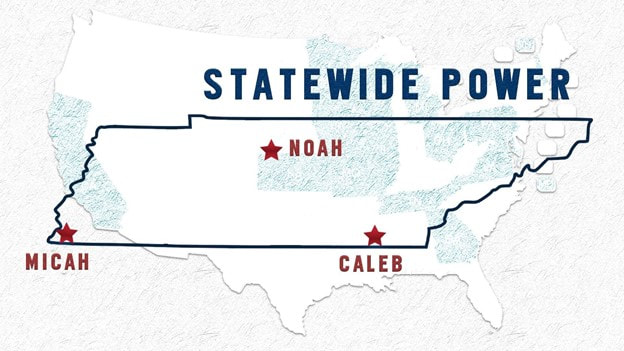 CALEB’s ongoing commitment to building community power is not an effort that is fought alone, but rather alongside sister organizations such as NOAH in Nashville and MICAH in Memphis. These groups work in their respective communities to advocate in fields such as education, economic equity, affordable housing, and criminal justice. Nashville Organized for Action and Hope (NOAH) is an "anti-racist faith-based coalition that is multiracial, multi-generational, and interfaith comprised of congregations, community organizations, and labor unions that work to amplify the power of ordinary people.” NOAH does not endorse political candidates, but rather gets them to endorse the organization’s issue agenda and pledge to work alongside NOAH if they are elected. In NOAH’s annual meeting that took place on October 17, the organization hosted a meeting that included the likes of MNPS Board Chair Christiane Buggs, Mayor John Cooper and Councilperson Sandra Sepulveda making commitments that will, “Help guide NOAH’s plans as we organize people and money around these issues.” NOAH made its own commitments as well, surveying the public on the upcoming 2022 elections of General Sessions and Criminal Court Judges who make decisions on bail, probation, and restorative practices. NOAH’s concerns around the criminal justice system, regarding mass incarceration and a judge’s role in determining the outcomes for arrested individuals, reflects the importance of electing those who will support fairness and equity in criminal justice. The Memphis Interfaith Coalition for Action and Hope (MICAH) has also been making strides in criminal justice as well. Comprised of more than 70 community and faith-based organizations, the coalition aims to fit against inequity and injustices in the Memphis area. In their annual public meeting, MICAH was joined by Police Chief Cerelyn Davis and Shelby County Sheriff Floyd Bonner. MICAH met with two goals in mind: Firstly, to get a commitment from Memphis and Shelby County police to support civilian-led intervention for behavioral and mental health incidents to free up law enforcement for policing in the community. Secondly, MICAH asked to meet quarterly on the prior mentioned mental/behavioral health crises. While Sheriff Bonner was not in attendance, he did agree to both of the coalition’s requests. MICAH also made requests to reduce mass incarceration, including limiting pretrial detention via money bail. The group asked Shelby County District Attorney Amy Weirich to create money bail policy within her office that will prioritize release of those who are not a danger to the community or a flight risk, using the least restrictive means of release. In addition to the steps mentioned above, MICAH also continues to push for a Conviction Review Unit, as District Attorney Weirich maintains her stance that it is unneeded because her "whole office" is a conviction review unit. Conviction Review Units have been implemented in 45 jurisdictions across the country, and have had major benefits, including the CRU implemented in Davidson County in 2016. MICAH, NOAH and CALEB continue to work collaboratively and with great momentum to achieve the aims listed above and much more making strides for equity in education, criminal justice, mass incarceration and beyond. Expanding Justice; New Initiatives in Hamilton CountyCALEB welcomes Project Return Thursday, October 28th at 5:00 PM EST to an event which the public is encouraged to attend. The event will play host to an open conversation regarding Project Return’s successful reentry model and how the community can better support and welcome those who were formerly incarcerated back into the community.
Project Return, which was founded in 1979 by two Nashville based reverends, Bill Barnes and Don Beisswenger, aims to aid those in reentry with the overwhelming obstacles between leaving prison and returning into the community. They have launched several groundbreaking programs in the field of reentry, such as Project Return Opportunities for Employment (PROe). This program provides those in reentry to develop work experience, while building a reference base and demonstrating reliability on the job. The program provides resources such as transportation, food bags and work supplies as well as other tools to help foster success in the workforce. The program launched in 2013 and has successfully placed 1,477 people in reentry into the workforce. In addition, Project Return also helps those in reentry find housing through their Project Return Opportunities for Housing program (PROh), which has acquired and rehabbed 25 homes since 2017. The program acts as a private rental market system and works with the PROe program to put those in reentry in work restoring houses that are then rented out to those in reentry. Through these programs and their work with other programs, Project Return has been able to put over 80% of those in the program into employment. In addition, recidivism rates for those in the program sits at an astonishing 15% compared to a national average of 50%. In keeping with their core tenants of prison in-reach, workforce development and employment opportunity, Project Return has become a staple of the Nashville community as a beacon of light for those in reentry. CALEB is proud and excited to host the virtual event, which will foster a valuable and constructive dialogue on the obstacles to reentry in the community and how both groups are working to support and aid the people being welcomed back into the community. Where: Virtual Zoom event When: Thursday, Oct. 28th, 5:00 pm - 6:00 pm EST Registration: https://us02web.zoom.us/meeting/register/tZ0vc-morjooE9NmdQSxgAbRiTx217MguQdC After registering, you will receive a confirmation email containing information about joining the meeting. |
ABOUT
CALEB is an institutional coalition of faith-based, labor, and community groups working to build power to affect change in Chattanooga, TN. Archives
May 2024
Categories |


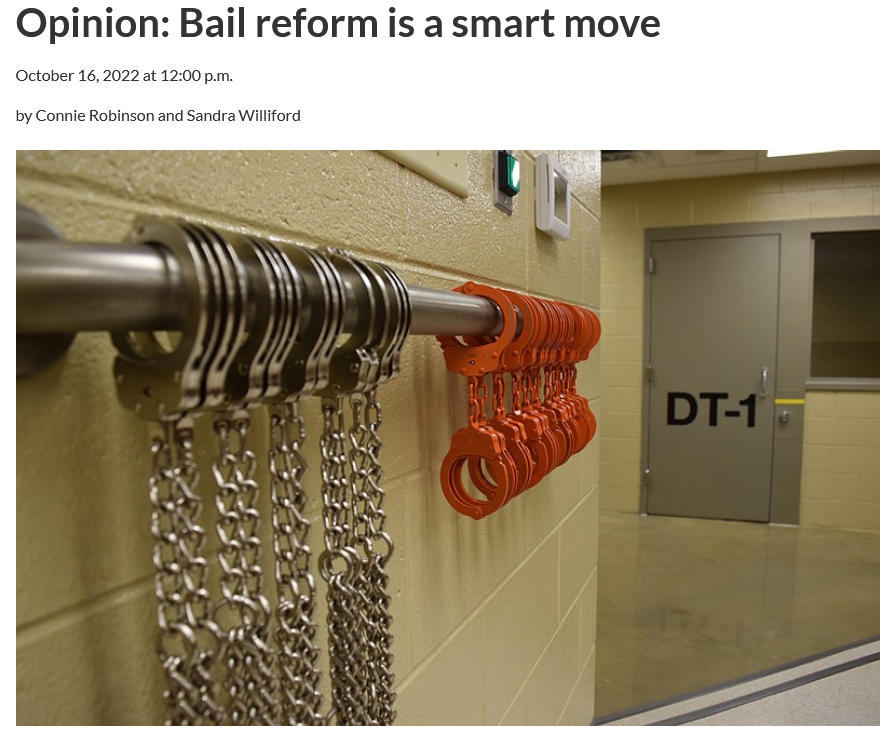
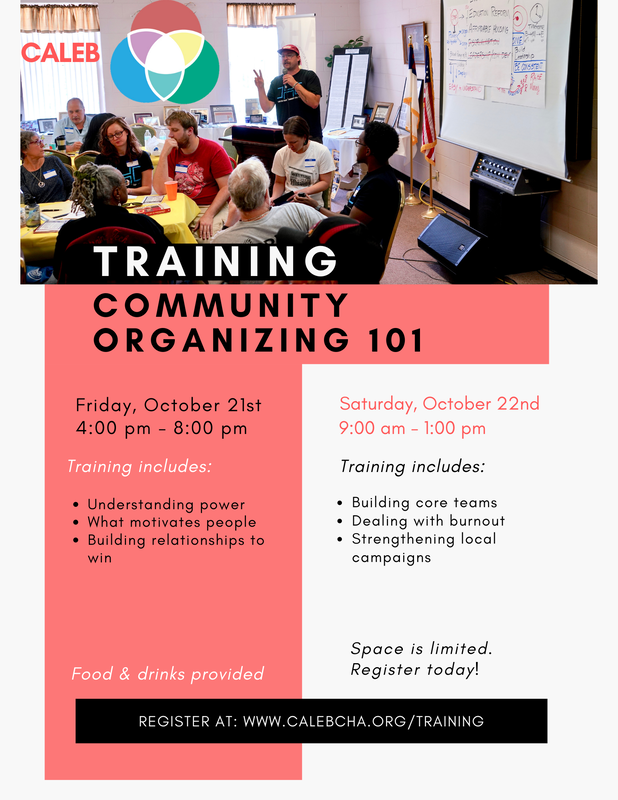
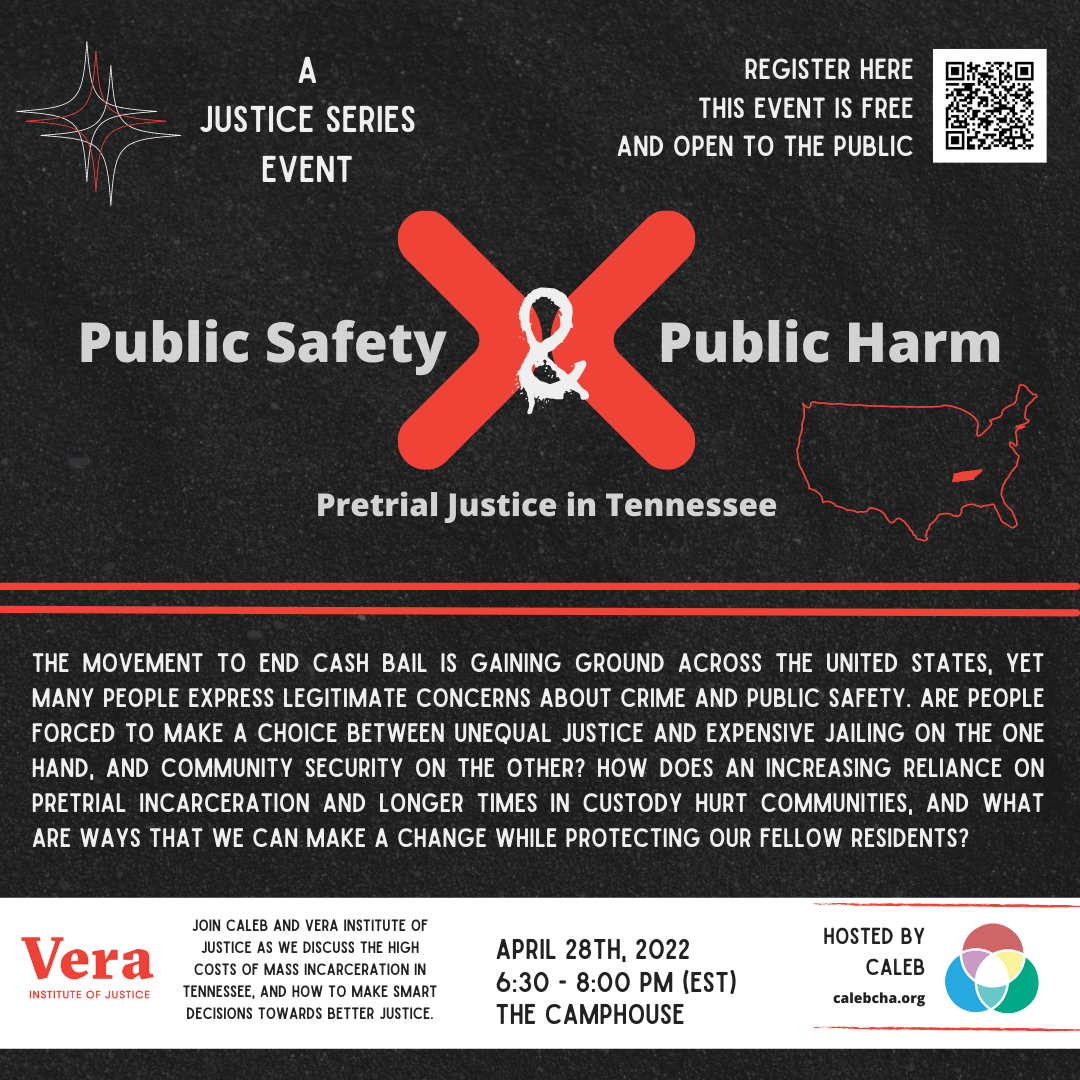
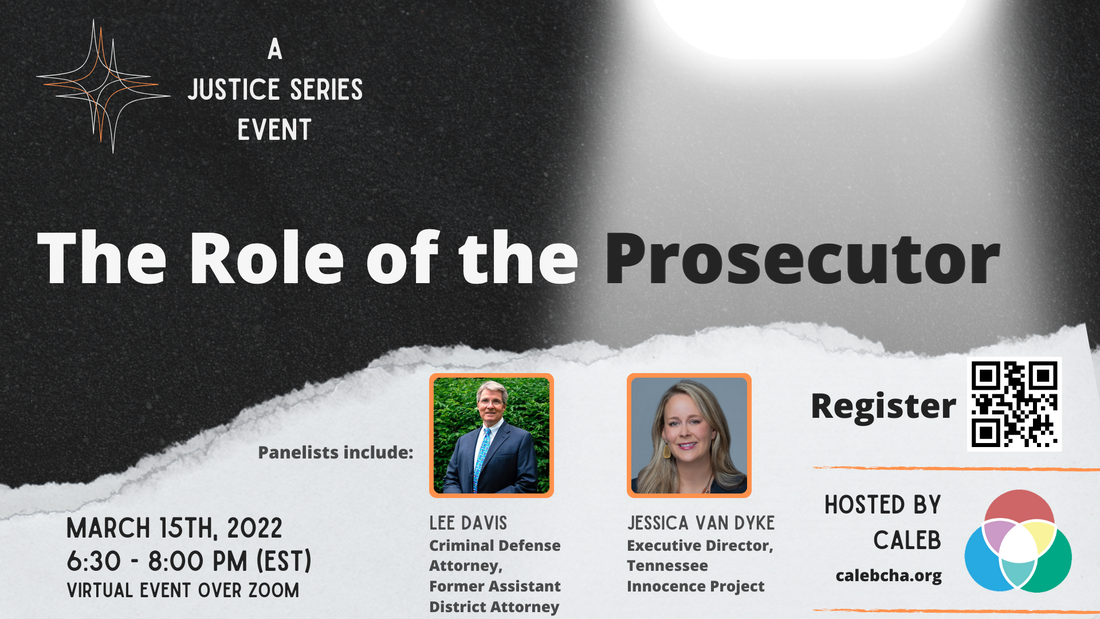
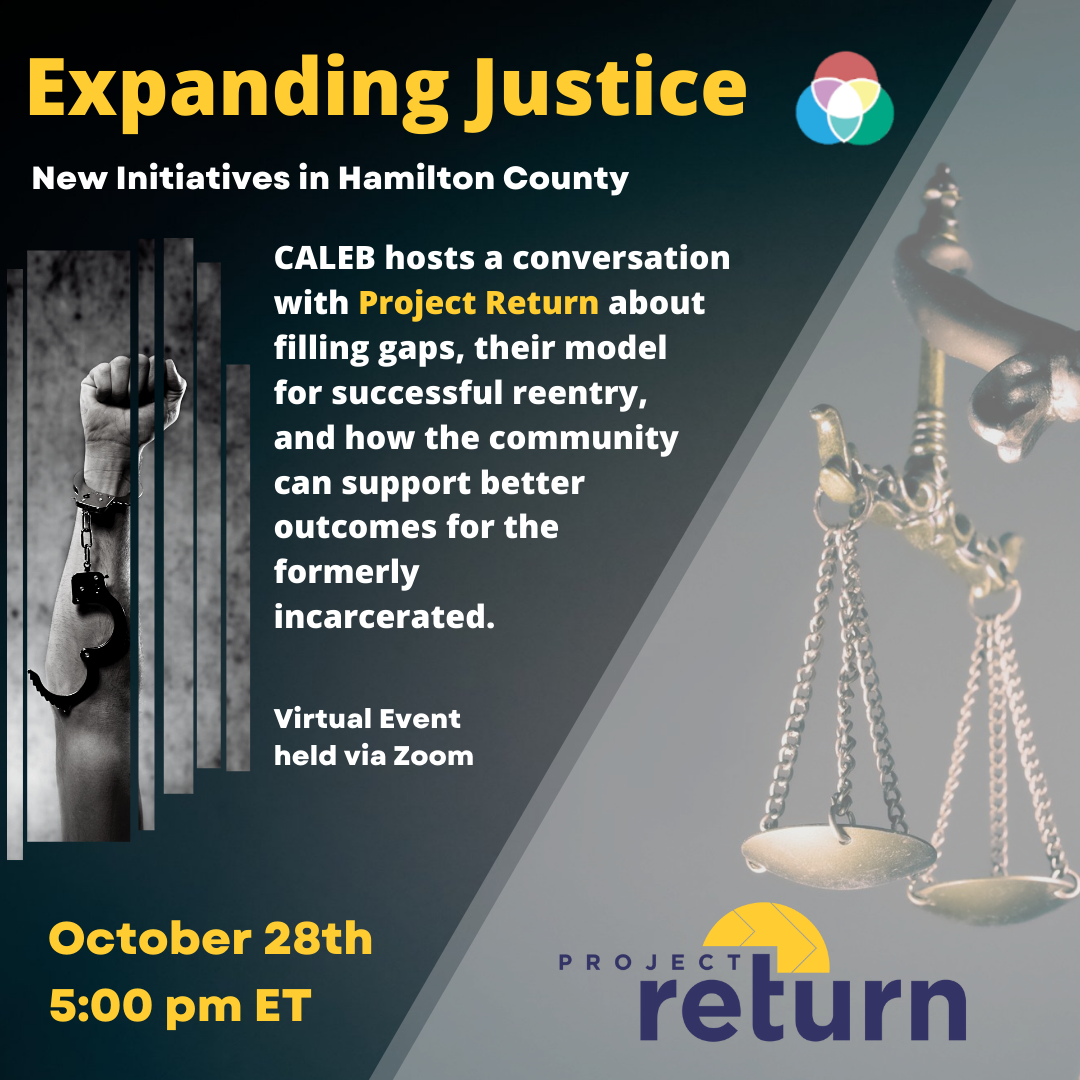
 RSS Feed
RSS Feed